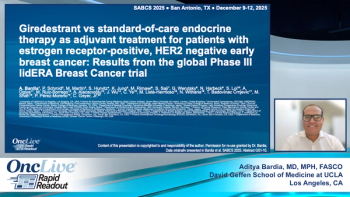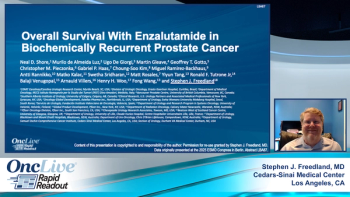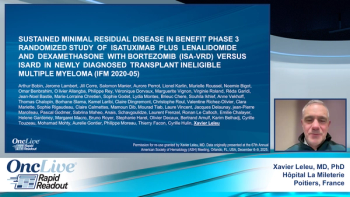
Rapid Readout: Updated results of tucatinib vs placebo added to trastuzumab and capecitabine for patients with previously treated HER2-positive metastatic breast cancer with brain metastases (HER2CLIMB)
Dr Bachelot, MD, PhD, presents updated results from the HER2CLIMB trial of tucatinib plus trastuzumab and capecitabine versus placebo plus trastuzumab and capecitabine in patients with HER2-positive breast cancer with brain metastases.
OncLive® Rapid Readout from San Antonio Breast Cancer Symposium 2021: Updated Results From the HER2CLIMB Trial
Segment Description:
Thomas Bachelot, MD, PhD, discusses data from the presentation, “Updated results of tucatinib vs placebo added to trastuzumab and capecitabine for patients with previously treated HER2-positive metastatic breast cancer with brain metastases (HER2CLIMB).”1
Segment Body Content:
- Tucatinib is an oral tyrosine kinase inhibitor highly specific for HER2 that is approved for use in combination with trastuzumab and capecitabine in adults with advanced or metastatic HER2-positive (HER2+) breast cancer, including patients with brain metastases, who have received 1 or more prior anti-HER2-based regimens in the metastatic setting.
- Methods
- All patients in HER2CLIMB had a baseline brain MRI. Patients with brain metastases were eligible and classified as untreated, treated stable, or treated progressing.
- Patients were randomized 2:1 to receive tucatinib 300 mg twice daily or placebo, each in combination with trastuzumab and capecitabine.
- Following the primary analysis, the protocol was amended to unblind sites to treatment assignment, and crossover from the placebo regimen to the tucatinib regimen was allowed.
- Efficacy analyses in patients with brain metastases at baseline were performed at approximately 2 years after the last patient was randomized by applying RECIST 1.1 to the brain based on investigator evaluation.
- Overall survival (OS) and central nervous system (CNS) progression-free survival (CNS-PFS) (progression in the brain or death) were evaluated in all patients with brain metastases.
- Patients without CNS-PFS events were censored at the last brain MRI.
- Confirmed intracranial (IC) objective response rate (ORR-IC) was evaluated in patients with measurable IC disease.
- All patients in HER2CLIMB had a baseline brain MRI. Patients with brain metastases were eligible and classified as untreated, treated stable, or treated progressing.
- Results
- At a median follow-up of 29.6 months, median OS was 21.6 months vs 12.5 months in all patients with brain metastases (hazard ratio [HR], 0.60; 95% confidence interval [CI], 0.44-0.81), 21.4 months vs 11.8 months in patients with untreated/treated progressing brain metastases (HR, 0.52; 95% CI, 0.36-0.77), and 21.6 months vs 16.4 months in patients with treated stable brain metastases (HR, 0.70; 95% CI, 0.42-1.16).
- Median CNS-PFS was 9.9 months vs 4.2 months in all patients with brain metastases (HR. 0.39; 95% CI, 0.27-0.56), 9.6 months vs 4.0 months in patients with untreated/treated progressing brain metastases (HR, 0.34; 95% CI, 0.22-0.54), and 13.9 months vs 5.6 months in patients with treated stable brain metastases (HR, 0.41; 95% CI, 0.19-0.85).
- ORR-IC was higher in the tucatinib arm (47.3%; 95% CI. 33.7-61.2) vs the placebo arm (20.0%; 95% CI, 5.7-43.7) for patients with brain metastases, and median duration of response was 8.6 months (95% CI, 5.5-10.3) vs 3.0 months (95% CI, 3.0-10.3).
- Conclusions
- With 15.6 months of additional follow-up, the tucatinib-trastuzumab-capecitabine regimen resulted in a robust and durable prolongation of OS for all patients with HER2+ metastatic breast cancer and brain metastases.
- Additionally, this benefit was maintained in patients with untreated/treated progressing and treated stable brain metastases.
- Treatment with tucatinib continued to show clinically meaningful benefit in CNS-PFS consistent with the primary analysis.
1. Lin NU, Murthy RK, Abramson V, et al. Updated results of tucatinib vs placebo added to trastuzumab and capecitabine for patients with previously treated HER2-positive metastatic breast cancer with brain metastases (HER2CLIMB) Poster presented at: 2021 San Antonio Breast Cancer Symposium; December 7-10, 2021; San Antonio, TX. Poster PD4-04.



































